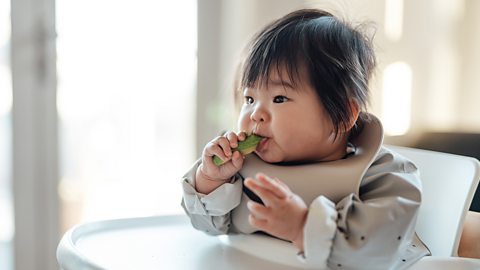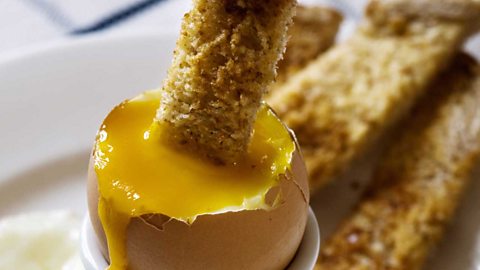What is baby led weaning? When can you start weaning a baby? How do you know your baby is ready? How do you ensure your baby is tasting a range of flavours?
We put the weaning questions you asked us on our to Angharad Banner, an NHS registered children's dietitian and a group of Health Visitors.
They shared loads of advice about weaning, baby foods, mealtimes with your baby… and much more!
For further information, advice and support around weaning visit the . And if you have any further concerns speak to your GP or Health Visitor.

Milk and Feeding
Am I feeding my little one too much milk?
If you are breastfeeding, then works well and your baby will be getting the right amount.
If you are bottle feeding then a rough feeding guide is written on the side of the tin. You can also check with your Health Visitor.
The NHS Start for Life say that your baby which gives you an idea of how much you should be feeding them.
Should I wake my baby in the night for a feed?
All babies are different and have their own unique feeding patterns.
As your baby grows, it is likely that they will start to go for longer periods between feeds. This can include fewer feeds in the night.
If they are growing steadily, feeding well during the day, having plenty of wet and dirty nappies, and are happy and healthy, you shouldn’t need to wake them for a feed.
As your baby continues to grow and develop, you might notice that his pattern changes again. This is normal and you can be led by your baby’s cues. If you are worried, you can speak to your health visitor.
Should I give my child whole milk or skimmed milk?
Breast milk is the only food or drink babies need in the first six months of their life. It's best to carry on breastfeeding alongside an increasingly varied diet once you introduce solid foods.
Infant formula is the only suitable alternative to breast milk in the first 12 months of your baby's life. Whole or semi-skimmed cow's milk can be given as a main drink from the age of one.
What’s the best alternative to cow’s milk?
An alternative to cow’s milk is soya or an oat based milk.
Do check that they are fortified with calcium and iodine. They should only be given as a main milk drink if your child is over one year and eating a variety of foods, as they are lower in energy and protein.
What is the best cup for my baby to drink from?
Dentists advise a free-flow open cup or a beaker with handles (for your child to hold themselves).
A cup or a beaker with a free-flow lid is better than a bottle or beaker with a teat, as it will help your child to learn how to sip rather than suck.
As soon as your child is ready, encourage them to move from a lidded beaker to drinking from an open cup. It might be messy at first but be patient, your baby will gradually learn.
All feeding equipment used for milk needs to be sterilised until your baby reaches 12 months of age.

Starting Weaning
How do I introduce weaning to my baby’s routine?
There is no set time that you should introduce weaning.
Try it at a time that works well for them, so it can be a relaxing and enjoyable experience for everyone. The first few times are more like tastes and are not nutritionally significant so you don’t need to worry about timing it with breast or bottle feeds.
A feed can be given as usual when your baby wakes up and breakfast can be offered around 30 to 60 mins after that. I would wait a little while after a meal before a bath, but there is no set time.
Start with one meal a day and increase to two when you feel your baby is taking a few mouthfuls. This can be within the first week but for some it may not be for a couple of weeks.
When should you move on to lumpier textures?
Babies take different amounts of time to get used to lumps, but it is something they need to learn so the NHS recommend introducing lumpier textures as soon as possible and supervising your baby to make sure they swallow safely. You might want to start by offering thicker purees and soft finger foods, before moving on to mashes, minced consistencies and chopped up family foods.
Check out our cheap and easy weaning recipes and child-friendly recipes broken down by age.
Why will my baby only eat one type of food?
It sounds like your baby has become accustomed to the taste and texture of a certain type of food and this is now their preference.
In between 6 and 12 months, your baby is at the perfect age to start exploring foods and discovering new flavours.
If your baby refuses the food on offer, try not to then automatically give them their favourite food as this will discourage them from trying new things. Have a little break and then offer something different.
Praise your baby if they try new foods and do not worry if they do not want the food, just try again at another mealtime.

Fussy Eaters
Is fussy eating normal? When should I seek help?
You are not alone! Many little ones may have a period of fussy eating in between 18 months and 2 years.
This includes refusing some foods at home that they will accept elsewhere, like at nursery.
There are some simple things you can try to encourage them to eat well at home, such as:
- getting them involved in making meals, such as washing fruits/vegetables or arranging the food on their plate.
- being a positive role model and sitting and eating alongside your child at mealtimes, making it a happy and positive event.
- keeping to a routine with set meal and snack times may also help.
- avoid pressuring them to eat a certain type of food if they refuse, as they may start to dislike mealtimes.
Read our article for more advice about dealing with fussy eaters.
It is recommended that all children take vitamins until they are 5-years old. Talk to your pharmacist to find out which ones are the best. Check to see if .
Babies who are having more than 500ml (about a pint) of infant formula a day should not be given vitamin supplements. This is because formula is fortified with vitamins A, C and D and other nutrients.
Should I be worried that my child isn’t interested in food?
It can be very stressful when your child doesn’t want to eat! Every baby is different, and their appetites do vary.
If your child is growing steadily, you should continue to offer them a variety of healthy meals and snacks.
Here are some other top tips:
- Aim to make mealtimes a calm and enjoyable experience. Do not put pressure on your child to eat more than they want to.
- Eat with your child, so that they can learn by copying you and other members of the family.
- Offer them small portions and give lots of praise, even if they only tries a little bit.
- Try some food play away from mealtimes to let them explore different textures and foods. This will help them to become more confident around new foods.

General Questions
Does my baby have a gluten intolerance?
It is quite rare for a baby to have a gluten intolerance, whilst constipation is quite common and has many causes.
Before you make any changes to your baby’s diet and exclude foods I suggest you speak to your GP or health visitor for advice.
When should my child be able to use a spoon?
Babies can start to use a spoon by themselves at around 10 to 12 months old.
But it’s usually not until between 18 and 24 months when your toddler will start to master the ability independently.
Keep giving your child opportunities to practise and they will get the hang of it. You could even try with two spoons and have a bit of fun helping them.






